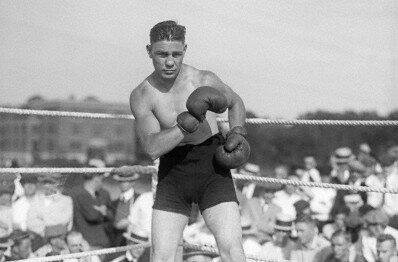Douglas Cavanaugh of Millvale has been a huge boxing fan since he was a child in the 1970s. In the early 1990s he became deeply involved in boxing history and wrote about the current state of boxing, publishing his first article in 1993.
“I wrote about my good friend, Ike Williams, the lightweight champion, who was controlled by the Mafia,” Cavanaugh said.
Cavanaugh's new book, “Pittsburgh Boxing: A Collected History,” explores the enormous contributions Western Pennsylvania has made to the sport. From Cavanaugh's assessment of Harry “Pittsburgh Windmill” Greb as the city's greatest boxer to anecdotes about Steelers founder Art Rooney's amateur boxing days, the book is a treasure trove of local history.
Cavanaugh, 56, recently moved to Millvale and lives not far from Hickey Park, a major boxing venue in the 1930s and '40s. He spoke to TribLive about growing up loving the sport and about working on his third book. This interview has been edited for length.
Q: How long have you followed boxing and what inspired you to write this book?
answer: While doing some general research into the history of the sport, I noticed that a disproportionate number of boxers in history that I admire all came from Pittsburgh: Harry Greb, Billy Conn, Charlie Burley, Fritzie Zivic (among others). Also, in a five-year period in the late 1930s and early 1940s, Pittsburgh produced five world champions. Keep in mind that there were only eight weight classes then. Today there are 17, with three to five “champions” per weight class. That's quite a remarkable achievement. It got me thinking, what's in the water here?
So to find answers, I decided to read books about Pittsburgh's illustrious boxing history and tradition. But when I went to buy books, there were none. It seemed like every major boxing city had a history book about it — New York, Philadelphia, Chicago, Detroit, Boston, Cleveland, Baltimore, San Francisco, Los Angeles — but Pittsburgh was the exception. It was shocking, considering how many champions and Hall of Famers have come out of here.
Q: What has been Pittsburgh's main contribution to boxing?
answer: The list of boxers goes on and on, but in terms of history, we were certainly way ahead of our time in the area of race relations in sports. The infamous “color line” was not recognized here. Any Pittsburgh boxer could fight any worthy challenger, regardless of race. So African-American boxers came from all over the country to fight in our clubs and arenas, like the great Henry Armstrong, who made his pro debut here. They were given spots on cards and big money. In the words of Hill District boxer Ozzie “Bulldog” Harris, “it was fair game.”
Harry Greb, the great middleweight champion from Garfield, was heavily criticized by some in the boxing world for giving a black man, Tiger Flowers, a shot at the title. But Greb fought all the heavyweights, black and white, and warded off the opposition. Greb was past his prime, while Flowers was, and was a dangerous challenger. As a result, Tiger Flowers became the first black middleweight champion in the world.
Q: In your opinion, who is the greatest Pittsburgh boxer and why?
answer: He beat Harry Greb, “The Windmill of Pittsburgh” with ease. There's no footage, but one look at his record says all you need to know. In 1919 alone, he fought 45 times from middleweight to heavyweight against champions, top contenders, journeymen and future Hall of Famers, and won them all. That's unthinkable by today's standards. He was so good that he was the top contender at middleweight, light heavyweight and heavyweight simultaneously.
Featured local businesses
Q: What's something people should know about Pittsburgh's boxing history that most people don't know?
answer: There are so many, it's hard to pick just one. Denzel Washington's character in “Fences” was based not on a baseball player but on Hill District boxer Charlie Burley, who was both August Wilson's neighbor and his hero. Even Sugar Ray Robinson and Henry Armstrong cut ties with Burley.
Pittsburgh Steelers founder Art Rooney was a top amateur boxer who could have had a great professional career had he decided to pursue it further. He chose other sporting interests instead and, to be honest, Pittsburgh benefited greatly from his decision. However, he later founded the Rooney McGinley Boxing Club, a powerhouse promotional company that groomed many future greats for Forbes Field.
“Pittsburgh Boxing: A Collected History” will be published by 21-66 Books. For more information, visit 21-66books.com
Patrick Varin is a Triblive reporter covering Delmont, Export and Murrysville. A native of Western Pennsylvania, he joined Triblive in 2010 after working as a reporter and editor for the former Dover Post Co. in Delaware. He can be reached at pvarine@triblive.com.

